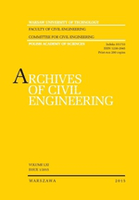
Archives of Civil Engineering
Scope & Guideline
Bridging Theory and Practice in Civil Engineering
Introduction
Aims and Scopes
- Structural Engineering:
Research and development of new materials, methods, and technologies for the design, analysis, and construction of structures, including bridges, buildings, and other civil engineering infrastructures. - Geotechnical Engineering:
Studies focusing on soil mechanics, foundation engineering, slope stability, and the behavior of earth materials under various conditions. - Transportation Engineering:
Innovations in the design and operation of transportation systems, including roadways, railways, and traffic management, aimed at improving safety and efficiency. - Environmental Engineering:
Research aimed at addressing environmental challenges related to construction, including waste management, pollution control, and sustainable practices in civil engineering. - Construction Management and Technology:
Focus on project management techniques, risk assessment, cost estimation, and the use of technology in optimizing construction processes. - Materials Science in Civil Engineering:
Investigation into the properties, performance, and sustainability of construction materials, including concrete, steel, and recycled materials. - Hydraulic and Water Resources Engineering:
Studies on the management and design of hydraulic structures, flood risk management, and the impact of water resources on civil engineering projects. - Smart Infrastructure and Digital Tools:
Integration of digital technologies, such as Building Information Modeling (BIM), IoT, and AI, to enhance the design, construction, and maintenance of civil engineering projects.
Trending and Emerging
- Sustainable Construction Practices:
Growing emphasis on research that promotes environmentally friendly materials and methods, reflecting the industry's shift towards sustainability and reducing carbon footprints. - Digital Transformation in Civil Engineering:
Increased publications on the use of digital technologies, such as BIM, AI, and IoT, to improve project management, design processes, and infrastructure monitoring. - Resilience Engineering:
Research focusing on enhancing the resilience of infrastructure against natural disasters and climate change impacts has become more prominent. - Advanced Materials and Nanotechnology:
Emerging studies on innovative materials, including nanomaterials and recycled products, aimed at improving performance and sustainability in construction. - Smart Infrastructure Systems:
Growing interest in developing smart cities and infrastructure, utilizing sensors and data analytics to optimize performance and maintenance. - Health and Safety in Construction:
Increased focus on improving safety standards and practices in construction, driven by the need for enhanced worker protection and accident prevention. - Urban Planning and Development:
Research addressing the challenges of urbanization, including sustainability in urban design, infrastructure development, and community resilience.
Declining or Waning
- Traditional Construction Techniques:
Research focused on conventional construction methods has decreased as the industry shifts toward innovative materials and techniques that enhance efficiency and sustainability. - Basic Theoretical Analyses:
Papers centered on fundamental theoretical studies without practical applications are less frequently published, indicating a preference for research that addresses real-world challenges. - Non-digital Project Management:
The focus on traditional project management methods and techniques is waning as digital tools and methodologies gain prominence in the field. - Manual Soil Testing Methods:
Research employing traditional soil testing methods is decreasing as advanced technologies and automated systems become more prevalent in geotechnical investigations. - Low-tech Environmental Solutions:
There is a decline in studies proposing basic environmental solutions, as the focus shifts toward more sophisticated, technology-driven approaches to sustainability in construction.
Similar Journals

Electronic Journal of the Faculty of Civil Engineering Osijek-e-GFOS
Championing Open Knowledge for Global Civil Engineering CommunitiesWelcome to the Electronic Journal of the Faculty of Civil Engineering Osijek-e-GFOS, a prominent platform dedicated to the dissemination of innovative research in the field of civil engineering. Published by the University of Osijek, this Open Access journal has been accessible to the global academic community since 2010, facilitating the sharing of knowledge and advancements without financial barriers. With an E-ISSN of 1847-8948, the journal aims to cover a broad scope of civil engineering disciplines, including structural engineering, geotechnics, environmental engineering, and construction management, among others. It serves as a crucial resource for researchers, professionals, and students, providing them with insightful articles and studies that contribute to the development of best practices in the field. By promoting open collaboration and knowledge sharing, the Electronic Journal of the Faculty of Civil Engineering Osijek-e-GFOS stands as a testament to the commitment of the University of Osijek to enhance the field of civil engineering through impactful research and educational outreach.

Civil Engineering Journal-Stavebni Obzor
Pioneering Research from the Heart of PragueWelcome to the Civil Engineering Journal-Stavebni Obzor, an esteemed academic publication dedicated to advancing the field of civil engineering. Published by the Czech Technical University in Prague, Faculty of Civil Engineering, this journal has provided a platform for innovative research and critical discourse since its inception. With an ISSN of 1210-4027 and an E-ISSN of 1805-2576, this Open Access journal has been facilitating wide dissemination of knowledge in civil engineering since 2014, ensuring that valuable research reaches a global audience without barriers. The journal is committed to fostering collaboration among researchers, professionals, and students, encouraging the exchange of ideas that drive the discipline forward. Its diverse scope encompasses various aspects of civil engineering, making it an essential resource for anyone looking to stay at the forefront of this dynamic field. Located in Prague, a hub of engineering excellence, this journal not only reflects the latest trends and innovations but also contributes to shaping the future of civil engineering.
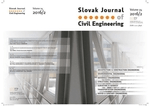
Slovak Journal of Civil Engineering
Empowering excellence in civil engineering research.Welcome to the Slovak Journal of Civil Engineering, a premier open-access publication dedicated to advancing the field of civil engineering. Published by SCIENDO, this journal has been providing a platform for the dissemination of groundbreaking research since 2010, ensuring that all articles are freely accessible to a global audience. With a commitment to promoting innovation and excellence within civil engineering, the journal covers a wide range of topics, including structural engineering, transportation systems, geotechnics, and environmental engineering. The Slovak Journal of Civil Engineering is designed to engage a diverse community of researchers, professionals, and students, fostering collaboration and knowledge-sharing to address contemporary challenges in the field. With its open-access model, the journal not only enhances visibility for authors but also ensures that the latest findings and methodologies reach practitioners and academics alike, making it an essential resource for anyone interested in civil engineering advancements. Stay connected with the evolving landscape of civil engineering through this influential publication.

Revista Ingenieria de Construccion
Shaping Tomorrow's Infrastructure Through Rigorous ResearchRevista Ingenieria de Construccion is a prominent open-access journal dedicated to advancing knowledge and practice in the fields of building and construction engineering, as well as civil and structural engineering. Published by the Pontificia Universidad Católica de Chile, specifically the Department of Engineering and Construction Management, this journal has been providing free access to quality research outputs since 1986, ensuring that vital information is available to both practitioners and academics globally. With its current placement in the Q4 category of both the Building and Construction and Civil and Structural Engineering quartiles, it serves as a platform for innovative studies and critical discussions, positioning itself strategically within the academic landscape. The journal is indexed in Scopus, ranking #157 in Building and Construction and #291 in Civil and Structural Engineering, reflecting the growing impact and relevance of its contributions. Researchers, professionals, and students are encouraged to engage with the rigorous and diverse content published within its pages, fostering a vibrant academic and practical discourse.
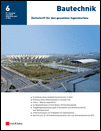
Bautechnik
Elevating standards in building and civil engineering scholarship.Bautechnik is a premier academic journal in the fields of Building and Construction and Civil and Structural Engineering, published by ERNST & SOHN in Germany. With a history dating back to 1969 and a significant converged timeline through various years, this journal offers a rich repository of peer-reviewed research dedicated to advancing the principles, methodologies, and innovations within its domains. Bautechnik is currently ranked in the Q3 category for both building and construction, as well as civil and structural engineering, indicating its relevance and contribution to the academic community. Though it does not offer open access, its curated content is accessible to a global audience of researchers, professionals, and students striving for excellence in their fields. The journal aims to foster discussions and disseminate knowledge that impacts the future of construction, architecture, and engineering practices.

Gradevinar
Elevating Standards in Civil Engineering Research and PracticeGradevinar, published by the Croatian Society of Civil Engineers-HSGI, is a leading Open Access journal in the field of Civil and Structural Engineering, with a significant history that dates back to its inception in 1980. This journal, with the ISSN 0350-2465 and E-ISSN 1333-9095, has established itself as a vital platform for disseminating innovative research and practical developments in civil engineering, particularly since it became Open Access in 2000, facilitating unrestricted access to its wealth of knowledge. As of 2023, Gradevinar is ranked in the third quartile (Q3) of Scopus’s Civil and Structural Engineering category, demonstrating its growing influence and relevance in the academic community, with a current ranking of #255 out of 379 journals in the field. Researchers, professionals, and students benefit from this journal's commitment to high-quality content that reflects the latest advancements and best practices in civil engineering, contributing to both technical proficiency and sustainable development in infrastructure projects across Croatia and beyond.
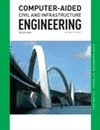
COMPUTER-AIDED CIVIL AND INFRASTRUCTURE ENGINEERING
Redefining Infrastructure through Innovative ResearchCOMPUTER-AIDED CIVIL AND INFRASTRUCTURE ENGINEERING, published by WILEY, stands as a leading journal in the domains of civil and structural engineering, computational theory, and computer-aided design since its inception in 1986. With an impressive ISSN of 1093-9687 and E-ISSN of 1467-8667, this esteemed UK-based journal holds a prestigious position in the academic community, reflected by its Q1 ranking in numerous relevant categories, including Civil and Structural Engineering and Computer Graphics as of 2023. The journal is renowned for promoting innovative research that utilizes computational techniques to solve complex engineering problems, making it an essential resource for researchers, professionals, and students alike. Despite its lack of open access options, the journal garners significant interest due to its rigorous peer-review process and high-impact articles, underlining its importance in the advancement of infrastructure engineering practices and technologies. With a Scopus ranking placing it among the top journals in various engineering and computer science fields, COMPUTER-AIDED CIVIL AND INFRASTRUCTURE ENGINEERING continues to foster knowledge and collaboration, ultimately contributing to the future of smart and resilient infrastructure development.

CIVIL ENGINEERING
Pioneering Research for Modern Engineering ChallengesCIVIL ENGINEERING is a prominent journal published by the American Society of Civil Engineers (ASCE), dedicated to advancing the field of civil engineering since its inception in 1969. With an ISSN of 0885-7024, this journal spans a wide range of topics, including civil and structural engineering, geotechnical engineering, and materials science, reflecting its comprehensive coverage of the discipline. Although currently categorized in the Q4 quartile for several fields, the journal provides a platform for researchers, professionals, and students to present innovative solutions and research findings that push the boundaries of civil engineering practices. While it does not offer open-access options, its accessibility through institutional subscriptions ensures that critical research remains within reach for those intent on furthering their understanding and applications in the field. Conference proceeding articles, case studies, and theoretical papers contribute to its mission of fostering communication and knowledge exchange among civil engineering practitioners and scholars. The journal's commitment to quality and relevance in today's evolving engineering landscape makes it an essential resource for informed decision-making and professional development.

Baltic Journal of Road and Bridge Engineering
Engineering Progress: Your Resource for Cutting-Edge ResearchThe Baltic Journal of Road and Bridge Engineering, published by RIGA TECHNICAL UNIV-RTU, serves as a pivotal platform for disseminating cutting-edge research in the fields of building and construction as well as civil and structural engineering. Established as an Open Access journal since 2006, it fosters global collaboration and accessibility to critical engineering knowledge, facilitating the exchange of innovative ideas among researchers, professionals, and students. With a commendable impact factor and recognition in Scopus rankings, where it stands in the third quartile for both relevant engineering categories, the journal underscores its significance in advancing the discipline. The journal aims to publish high-quality, peer-reviewed articles that address contemporary challenges in road and bridge engineering, making it an essential resource for anyone involved in infrastructure development and research. Located in Lithuania at 6B Kipsalas Street, RIGA LV-1658, this journal not only highlights the latest advancements but also seeks to inspire future innovations in engineering practices.
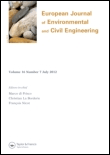
European Journal of Environmental and Civil Engineering
Pioneering Research at the Intersection of Environment and InfrastructureThe European Journal of Environmental and Civil Engineering, published by Taylor & Francis Ltd, is a prestigious peer-reviewed journal that serves as a vital platform for advancing knowledge in the fields of Civil and Structural Engineering as well as Environmental Engineering. With an impressive impact factor and categorized in the Q2 quartile for both engineering fields, this journal occupies a significant position in the scholarly community. Its focused scope encompasses innovative research, case studies, and practical applications that address contemporary environmental and infrastructural challenges. Researchers, professionals, and students alike benefit from the journal's commitment to high-quality discourse, as evidenced by its Scopus rankings, which place it in the top 30% in Civil and Structural Engineering and the top 40% in Environmental Engineering. Through the publication of cutting-edge studies and a commitment to fostering interdisciplinary dialogue, the European Journal of Environmental and Civil Engineering remains an essential resource for those dedicated to improving our built environment and safeguarding our natural resources.